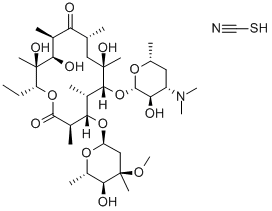b

Thank You!
Your requirement has been sent, we will contact you quickly!
Sent Failed!
Try again!
Introduction:
Erythromycin thiocyanate is the thiocyanate of erythromycin, a commonly used macrolide antibiotic. This product is a veterinary drug used to treat the infection of Gram-positive bacteria and pathogens. It has been widely used as an "animal growth promoter" abroad. It is listed as one of the four exported veterinary antibiotic products in China together with tylosin, tetracycline hydrochloride and terramycin. In addition, this product is also an important intermediate for the synthesis of mainstream macrolide antibiotic products erythromycin, roxithromycin, azithromycin and clarithromycin.
CAS:7704-67-8
Molecular formula: C38H68N2O13S
Molecular weight: 793.02
Structural type: 
Purpose:
The antibacterial spectrum of erythromycin thiocyanate is similar to that of benzylpenicillin. It has a strong effect on Staphylococcus aureus, Streptococcus and pneumococcus in Gram-positive bacteria, and also has a certain effect on pasteurella and Brucella in Gram-negative bacteria; In addition, this product is also effective against Mycoplasma, Rickettsia, Leptospira, actinomycetes and Nocardia, but has no effect on intestinal negative bacteria such as Escherichia coli and Salmonella. It is mainly used for serious infections caused by drug-resistant staphylococcus aureus and hemolytic streptococcus, such as pneumonia, sepsis, endometritis, mastitis, etc; It also has good curative effect on poultry chronic respiratory disease and swine mycoplasma pneumonia caused by Mycoplasma. It is also used in the treatment of nocardiosis in dogs and cats; It can also prevent and control the white head and white mouth disease of green, grass, silver carp, bighead carp and other fry and species, the Bacterial Gill Rot Disease of grass carp and black carp, the white skin disease of silver carp, bighead carp and other fish, and the Streptococcosis of tilapia.

